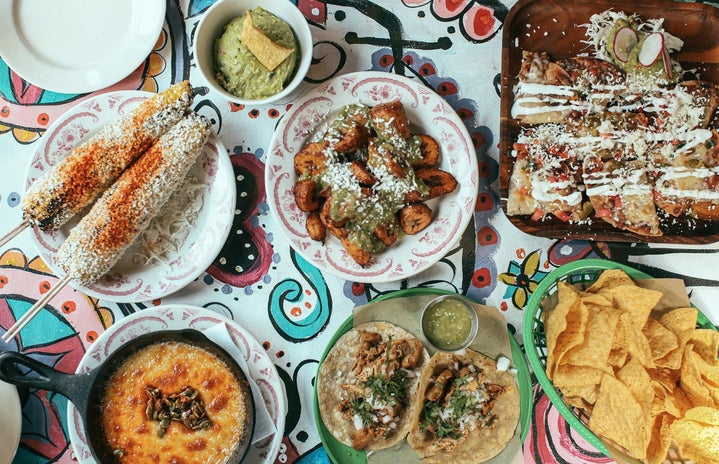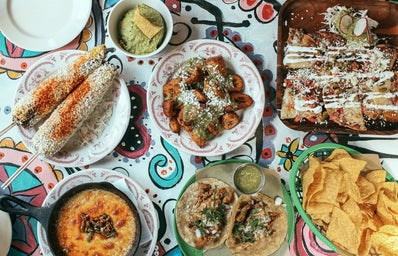The dinners in my family are extraordinarily cinematic. My uncle/aunt will say something both politically incorrect and hilarious, another would choke on their food while laughing at the joke. Both my grandmother and I eat enormous amounts of red chili with our food, have comically loud hiccups (while my grandfather burps as loudly as possible) and neither of us drink water to calm it down for some reason. My grandmother and I did not coordinate our taste for extreme spices and chili-eating extravaganza, it just turned out that way. Heredity is a strange thing.
Occasionally, someone says something personal or tragic, and the aunt taunts them about it but then instantly tries to cheer them up with words and more food. Both my grandparents insist on us taking second helpings, then third, fourth, and fifth until before my cousin brother makes sarcastic comments about how much I’m eating. The best way to understand the dynamics within a family or two or more people, I have come to realize, is through studying what they discuss at the dinner table.
When the most dysfunctional of families put up a show of affection and care, when a loveless couple pretends to like each other so as to not create a scene in the middle of the restaurant, when ex-best friends share a meal together due to their merged groups, an observer could figure out the pretense from genuine exchanges in these situations. And there’s always a tell. Who sits to eat at the end, when the other person’s meal is almost over? Who puts the plates? Who avoids eye contact? Who toys with their food?
As an observer of this remarkably primitive practice where a range of human emotions are served on a dining table along with food, I suppose it psychologically compels us to be ourselves a little more than usual since it is one of the earliest practices of the human race. And so perhaps the camera sees that emotional rawness, that strikingly humane nature of dining tables and the small chairs around them as pillars. A camera in the room might behold the love, chaos, friction, and affection of it all and that’s where cinema comes in. Here are 3 different kinds of dinner table conversations and their essence :
Slice of Life Conversations
A mixture of satire (borderline scandalous) and solicitude, these conversations feel as if they’ve been borrowed from our life. As real and sarcastic as they are, they don’t tend to be so tense as irredeemable, and nor are they so funny that they can be dismissed as to all games. Life too, although as intense as it can be, gets amusing at the end of the day when you’re with the people you’re close with. Maybe then you realize how minute these things are in front of the relationships you have. Piku(Dir. Shoojit Sircar) depicts this kind of dynamic where the dinner table conversation between the protagonist (Bashkor) and his daughter framed the course of the story through a raw depiction of these kinds of conversations.
Conversations of Pretense
These switch between those pretending to be functional or likable and two people who have a genuine interest in each other. Fleabag (Creator Phoebe Waller-Bridge): A fancy dinner at a restaurant, a modern family dynamic with the dad and the stepmom, your sister with her dysfunctional relationship with her husband that they’re both trying to hide, and then you, the black sheep of the family. A layer of pretense coats every question, conversation, and comments to prevent a scenic breakdown of every single dynamic. If not for the priest, it would’ve been a conversation straight out of a script the family members prepared before coming to the diner.
Forced Conversations
Conversations that are forced to fill in awkward/uncomfortable silences. With a lot of topics uncovered and hiding beneath the table or strangers meeting for the first time, the long pauses shape the dynamics at this dinner table situation. Not sure whether you talk about the weather, the political climate, or career prospects, the dialogues are not organic and don’t come from a place of interest/comfort. Breaking Bad (Creator Vince Gilligan) explores this relationship with Jess, Skylar, and the protagonist i.e the professor where all 3 are in a very awkward position to talk about whatever’s happening behind the criss-cross dynamics present.
Family dynamics or every relationship whatsoever are simplified with a plate and fork and a common roof over. Dinner table after all these years is an arena for these dynamics to unfold and cinema indeed captures them in the rawest form, the curtains finally get pulled back with the audience watching these conversations and relating themselves to them. And I hope you do too.
Have a happy meal, folks!


